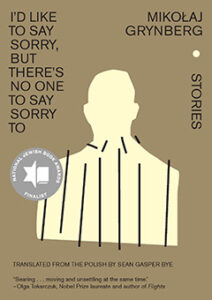Fiction. 160 pgs. The New Press. February 2022. 978-1-62097-683-8.
 Mikolai Grynberg’s first book of fiction, I’d Like To Say Sorry, But There’s No One To Say Sorry To, is about absence. Translated from Polish by Sean Gasper Bye, I’d Like To Say Sorry, But There’s No One To Say Sorry To captures the effects of the Holocaust and antisemitism in modern day Poland via thirty-one short stories, each told by a different character in first-person to a character named Mr. Grynberg, who has a similar identity to the author: a psychologist, writer, and photographer, whose work has involved documenting the stories of Jews who survived the Holocaust, Polish Jews who’d moved to Israel, and Jews who were forced to leave Poland in 1968 after the government put together an antisemitic campaign.
Mikolai Grynberg’s first book of fiction, I’d Like To Say Sorry, But There’s No One To Say Sorry To, is about absence. Translated from Polish by Sean Gasper Bye, I’d Like To Say Sorry, But There’s No One To Say Sorry To captures the effects of the Holocaust and antisemitism in modern day Poland via thirty-one short stories, each told by a different character in first-person to a character named Mr. Grynberg, who has a similar identity to the author: a psychologist, writer, and photographer, whose work has involved documenting the stories of Jews who survived the Holocaust, Polish Jews who’d moved to Israel, and Jews who were forced to leave Poland in 1968 after the government put together an antisemitic campaign.
The absence in the book is found primarily in the Jews who come to share their stories with Mr. Grynberg. The two most common types of story in the collection show the following conflicts: of discovering that either the narrator or someone close to them is Jewish, or attempting to hide a child or grandchild’s Jewish identity from them. To hide their family member’s Jewish identity was seen as a protective act that wore on the holder of the secret rather the family member themself. The response to discovering one’s Jewish identity is mixed, offering a wider range: some resent the discovery, for now their lives are tainted for being Jewish, and others resent not having known, as it disconnected them from their past. In all these stories, Jews and Jewish life exists in the shadows, hidden from the public eye—a sentiment that the author is challenging by putting together all these stories that directly address Jewish existence in Poland. It is a radical—and very moving—stance to take.
The gentile Poles who come to Mr. Grynberg do not see the Jewish absence as the Jews do. To them, Jews still take up too much space in their collective consciousness. One character comes to Mr. Grynberg to ask if he can prove to his family and coworkers that he is not Jewish, because he’s been receiving so much harassment for it. Another comes to Mr. Grynberg to tell him to stop writing about Jewish life because he purportedly believes that it’s making things worse for the Jews. “You want to convince the nation that Jews were Poles. What for? Everyone’s got their minds made up…Please try to see it from another perspective. For the common good.” (86-7). Neither of these characters—in addition to the other gentile Poles in the collection—are concerned with the Jews’ wellbeing; instead, they’re concerned about the Jews’ impact on their mental landscape and how they can effectively sponge it out. For them, they wish to force absence—not through death, as in the Holocaust, but through shame, shunning, and verbal abuse.
This concept is summed up in one of the collection’s most powerful, devastating stories—the one in which the book gets its title. In this story, a Polish woman wishes to apologize to people she had harassed because they were Jewish—yet, she does not want to apologize to them because she felt what she did was wrong, but because, in retrospect, she worried that they weren’t Jewish, and therefore didn’t deserve the treatment. Again, a wish to push out the Jews and welcome in the gentile Poles, creating and ignoring an absence.
The stories that most stand apart from the rest of the collection are those that involve Israeli Jews and their interactions with Polish Jews. Often, there is a disconnect between them, as with a Polish Jew in one story who guides an Israeli Jew through the concentration camps in Poland. He resents the Israeli’s interest in them, as he’s lived with the history and the camps’ presence his whole life and has grown tired, even resentful, of the Jews who come from around the world for visits. In another, a Jewish Pole goes to Israel and finds tremendous peace standing on a platform at a train station among the “Jewish diaspora” (28), and then later, listening to a violinist on the street, feels his “empty Jewish soul” (30) fill up with warmth, before being given a tirade by an Israeli Jew about how Polish Jews are “[t]raitors to [Israel], legitimizing Polish antisemitism by their presence” (30). These disconnects, Grynberg shows, are another example of the Holocaust’s aftereffects: a severing of ties, of feeling out of place and out of sync with those who had once shared a community.
The book’s structure—thirty-one brief short stories—is compelling, in that it creates a loud cacophony that demonstrates just how tremendous the psychic impact the Holocaust and antisemitism has had on Poland. Yet, the form sometimes detracts from the book, as the stories can resemble one another and read as repetitive, such as with the common story of hiding someone’s Jewishness from them. Of course, their similarity proves the point that the experiences shown are shared widely, that antisemitism and intergenerational trauma are not apparent in a few individuals but in the whole culture. Nevertheless, although the book’s form deepens its message, it can also negatively affect the reading experience.
The collection ends with a word of advice being given to Mr. Grynberg by a Jewish man who has known Mr. Grynberg for a long time. It’s a dark speech, reflecting on the lack of Jews in Poland and what that means for those that remain:
“I think you realize the place you live in is drying up. If you’d been born a few generations earlier, you’d be living right in the middle of a gushing current…Some people are born too early, but we were summoned here too late…The issues of the next generation are beyond my jurisdiction now. What you’ll give your children is your business. If you know how to pass on happiness to them, then congratulation, though when it comes to joyful inheritances, call me a skeptic.” (127, 128, 130)
It is a sobering, if not heartbreaking, reflection to end the collection on. Yet, again, this appears to be the intention of book: to center the absence, the loss of hope, the sense that the characters themselves are present-day ghosts, hiding in plain sight. By the time the reader puts the book down, they are left with the Jewish characters’ unease, their uncertainty on how to possibly move forward in this country that does not welcome them. In doing so, Mikolai Grynberg has put together a collection that is effective and deeply felt.
I’d Like to Say Sorry, but There’s No One to Say Sorry To is available through The New Press. Purchase it now through your local bookstore.
Like what you’re reading?
Get new stories or poetry sent to your inbox. Drop your email below to start >>>
NEW book release
Ghosts Caught on Film by Barrett Bowlin. Order the book of which Dan Chaon calls “a thrilling first collection that marks a beginning for a major talent.”
GET THE BOOK


